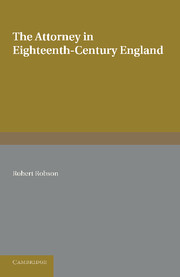Book contents
- Frontmatter
- Dedication
- Contents
- General Editor's Preface
- Preface
- Chapter I Attorneys and Solicitors Before 1700
- Chapter II Regulation of the Profession
- Chapter III The Society of Gentlemen Practisers
- Chapter IV The Provincial Law Societies
- Chapter V The Making of an Attorney
- Chapter VI The Attorney in Local Society
- Chapter VII Estates and Elections
- Chapter VIII Administration and Finance
- Chapter IX Two Attorneys
- Chapter X The Road to Respectability
- Appendix I The Apprenticeships of Richard Carre and Samuel Berridge
- Appendix II The Admission of an Attorney
- Appendix III Christopher Wallis: Notes from the Journal
- Appendix IV A Note on Numbers
- Appendix V The Professions in the Eighteenth Century: a Bibliographical Note
- List of Primary Sources
- Index
Chapter V - The Making of an Attorney
Published online by Cambridge University Press: 05 June 2016
- Frontmatter
- Dedication
- Contents
- General Editor's Preface
- Preface
- Chapter I Attorneys and Solicitors Before 1700
- Chapter II Regulation of the Profession
- Chapter III The Society of Gentlemen Practisers
- Chapter IV The Provincial Law Societies
- Chapter V The Making of an Attorney
- Chapter VI The Attorney in Local Society
- Chapter VII Estates and Elections
- Chapter VIII Administration and Finance
- Chapter IX Two Attorneys
- Chapter X The Road to Respectability
- Appendix I The Apprenticeships of Richard Carre and Samuel Berridge
- Appendix II The Admission of an Attorney
- Appendix III Christopher Wallis: Notes from the Journal
- Appendix IV A Note on Numbers
- Appendix V The Professions in the Eighteenth Century: a Bibliographical Note
- List of Primary Sources
- Index
Summary
IN the education of the attorney the Inns of Chancery played little, and eventually no part. They never performed for the profession those services which the Inns of Court rendered the barristers. In spite of the repeated injunctions of the judges that all attorneys should belong to one or other of these Inns, they continued to decline throughout the seventeenth century, and by the eighteenth century they were of negligible importance in the history of attorneys and solicitors. Those services which they could have performed by giving institutional representation and control to the profession were taken over by bodies specially created for this purpose which have just been described.
There were two general reasons for this decline. In the first place, the profession became too large for the Inns to hold all its members, who were in any case too widely scattered in the provinces for membership of an Inn to be anything more than nominal. This was probably true of an increasingly large proportion of the profession, as the country attorney became an established figure in provincial life, relying on an agent in London to perform those functions for his clients which demanded personal attendance at the courts or law offices in town. In the second place, the Inns of Chancery declined because the sort of education they could provide —occasional readings by some barrister from the Inns of Court which patronised them—was totally inadequate as a training for the sort of work which the attorney was called upon to do. His employment was eminently practical in character, concerned with the forms of legal processes and the application of the laws to a wide variety of situations: he was judged by his acquaintance with the techniques of the law, rather than by his knowledge of its more theoretical aspects.
This being so, the obvious way in which to educate the attorney, the apprenticeship system, was the one adopted.
- Type
- Chapter
- Information
- The Attorney in Eighteenth-Century England , pp. 52 - 67Publisher: Cambridge University PressPrint publication year: 2013



